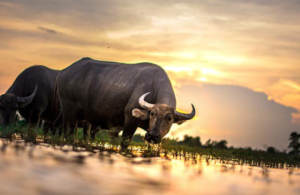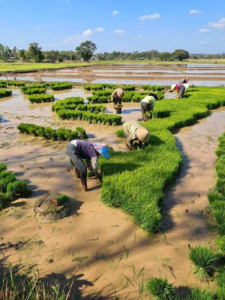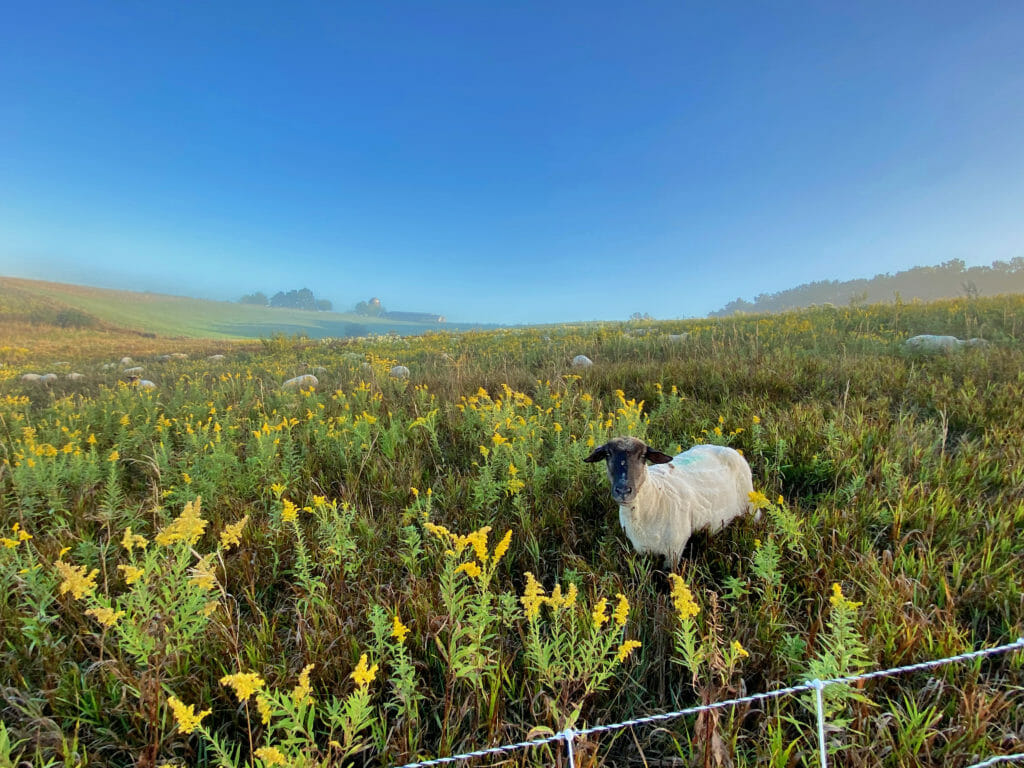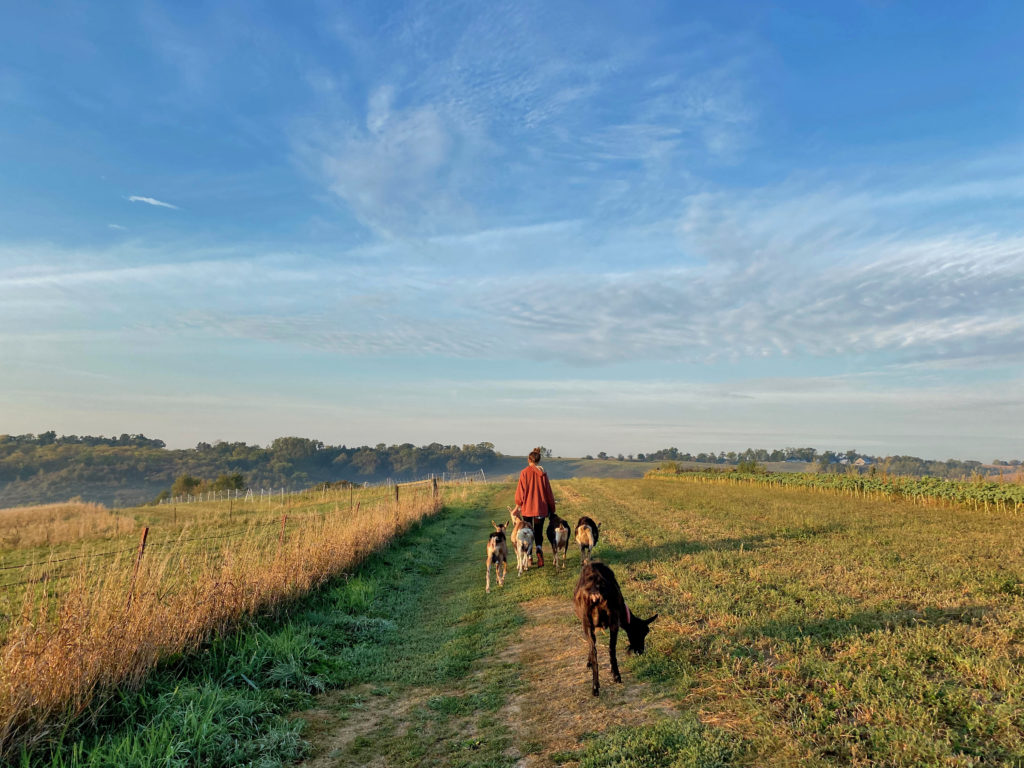Farmer Stories
Following lunch, you shimmy past a couple legs and bags to an unoccupied seat. The gentle thrum of guitar chords softens and stops as five PFI members grasp the mic in turn. A row ahead, two friends turn to give each other a knowing glance. From the corner of your eye, you see a hand rise to meet a damp cheek. Behind you, there is a muffled gasp just before a burst of laughter. And every 10 minutes, your hands rise and contribute to a wave of applause that cascades down the terrace of auditorium seats to thank a gratified storyteller.
Introduced virtually in 2021, PFI’s farmer storytelling feature was so well received, we brought it back for our 2022 annual conference. The event embodies a fundamental aspect of PFI culture: sharing experiences to learn, connect and expand our horizons.
The theme of this year’s storytelling event was water. While water is essential to all of us, farmers have a distinct respect for the influence it wields over the success of a season and their livelihoods. Five members – Levi Lyle, Air Philavanh, Cathy Lafrenz and sisters Maja and Carmen Black – shared memories demonstrating water’s healing, harrowing and humorous potential.
Live music, played by Levi, greeted attendees entering the auditorium. Jill Beebout, a 2021 storyteller who operates Blue Gate Farm in Chariton, Iowa, returned as emcee to welcome and guide the audience through the performances. The event was livestreamed so those unable to attend the in-person event could watch from home – including this year’s storytelling coach, Mary Swander.
For those who missed the event, or wish to experience these moving and evocative stories again, we are sharing them on the following pages. The stories are largely preserved as orally presented, with light edits for style and clarity.
When I moved back to the farm more than a decade ago, I resolved to find where I fit among a farmscape of industrial agriculture. I was observing more frequent gully washers, an expression for hard rain, and the beginning of a new normal of severe weather. The following experience unfolds during that process of trying to figure out how I fit onto the farm.
Following a June hailstorm that whipped and tattered the leaves of the corn, my father and I went out to the field to meet the crop insurance adjuster. Crop insurance works like this: If the severity of the bullet-sized holes in the corn result in yield loss, the insurance adjuster writes up a report and the farmer gets a check in the mail for the profits that he would’ve received. As the insurance adjuster pulled up in his car that day, he got out. What I noticed was that he was about my age, average-size build, nothing particular – until he came walking across the road towards us. At that time, I saw he had a limp in his walk.
During introductions, I recalled two things. One, he had children about the same age as my children, and two, he was a veteran. We started out into the field. We came to the headland rows, and first we had to cross the perpendicular headland rows. He struggled to lift his leg up over that first row. He grimaced in discomfort. I thought to my myself, “Oh boy, this is going to be uncomfortable for him.” By the time we got to row 24 and there was nothing but the long, straight rows ahead of us, it would be much easier for him now. I sensed he was relieved. I was thinking to myself, “Is being a crop insurance adjuster really the right job for this person?” It’s then that I got up the nerve to ask, “Is your injury related to your military service?” He told me a remarkable story that would help shift and shape the way I think of my place on the farm.
He said: “I was working for the state patrol doing a routine traffic stop, writing a ticket. Speeding ticket, of all things, when I was struck by a passing automobile. I was hurt badly, landing about 20 feet from the scene. A semitruck driver passing by saw this as an opportunity to steal a state patrolman’s handgun. He came over and was trying to pull the gun from my holster. I was fading in and out of consciousness and I was in a struggle with him. Meanwhile, another passerby in his semitruck saw what was happening and he understood that a state patrolman’s 40-caliber is worth a lot of money on the black market. He came down from his big rig. He was 6-foot-6 and 300 pounds. He came over and picked up that no-good, fill-in-your-expletive. Up, up into the sky he went like a bird. I was relieved. I shattered my leg, but I would be okay. And the best part was this angel of a man, my hero, came to see me in hospital and I got to thank him.”
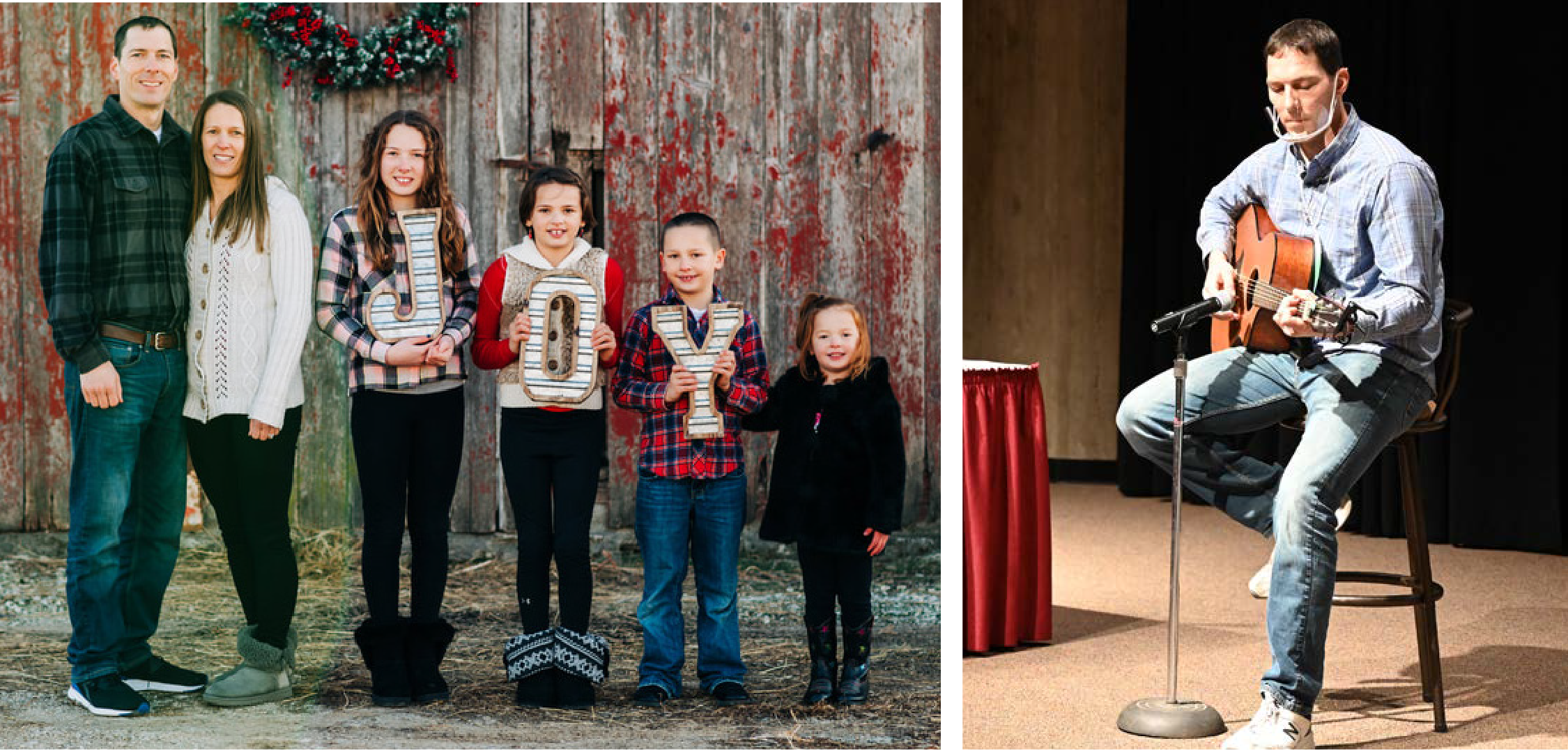
Left: Levi Lyle with his wife, Jill, and children Olivia, Elyse, Emerson and Ivy. Right: Levi performs his music during the storytelling session at PFI’s 2022 annual conference.
By now we were only a little ways out into the cornfield because we were walking slowly due to his disabled leg. I didn’t know what to say. It didn’t matter, though, because he rolled right onto his next story. “During basic training, after a three-day sleep deprivation test, the sergeant called me into his office. He wanted me to apply to SEAL school. I turned to him: ‘Navy SEAL?’ One year later, I was in Colombia doing undercover drug cartel intelligence. My job was to take down the bad guys or die trying. I was shot multiple times.” We were a little farther out into the cornfield now and I was thinking this man has suffered trauma. I had been a school guidance counselor previously, so I understood sometimes the best thing you can do is just to listen.
Here we were at the most beautiful place in the world, the middle of an Iowa cornfield in mid-June. The tranquility of the open space, the breeze whispering through the ears of corn. I knew it was my job at that moment to listen. If there wouldn’t have been any people out there in the field to hear his story, I’m sure he would’ve been telling his story to the ears of corn. He continued: “I was wired. I got found out and things went very badly for me. I was shot in the neck, the hip, the shoulder. One in my belly just missed my spine. Navy SEALs carry plugs made of cotton. You push them into the wound and they expand. They are amazing because they get you back into the fight.”
By now we were nearing a low area of the cornfield. I could hear water trickling from a nearby tile into the creek. This is where gullies notoriously fester in this field. Heaps of woven wire fences are in those gullies, reclaimed by the earth. I had spent my childhood tearing out those woven wire fences so we could farm fencerow to fencerow. Now, in a tangle of sagebrush and birch that wound their way up through those rusty woven wire fences, up into the sky into a canopy, songbirds were singing. These rolls of rusty woven wire fence plug wounds. And being an insurance adjuster was the perfect job for this person. I understand now where I fit on the farm. I see the farmland as the ancestral Mother Earth, Gaia: the importance of the lunar cycles, the changing of the seasons, protecting the land from those gully washers during the steady growth of corn all through the summer, like the unreprising care of a mother.
Levi Lyle and his family farm near Keota, Iowa, raising organic corn and soybeans as well as aronia berries, tart cherries and various other fruits. Levi’s Indigenous Fruit Enterprises (LIFE) seeks to facilitate the profitability and sustainability of small farms. Previously an organic inspector, Levi now consults farmers transitioning to certified organic production. He is also a podcaster and author of two books, available here.
I live here in Milo, Iowa, south of Des Moines, but I came from Laos. My hometown in Laos is close to the Mekong River.
I could see the river every day, all year long. In winter though, the water level goes down as the river dries and the sandbars come up. The river, and the sandbar in the middle, is the border between Laos and Thailand. I remember I was around 10 years old, a young boy looking for good fun. One morning, when I didn’t have school, I sat on a bench along the river. I looked out at the river and saw the sandbar. “Hey, some good fun is coming.” Me and my friend got together, brought our soccer ball and inner tube, walked down to the river and swam across.
More friends were at the Thailand border. They came down to the sandbar, too. Every winter, we had a good time on the river with Thailand friends. We played soccer, everything together. When we got tired, sometimes we stayed the night in Thailand, sometimes we came back home.
When I went down to the beach, I brought my dog. His name was Lulu and he always followed me to the sand beach to play soccer. But one night, my dog didn’t come home with me. He went to the other side, to Thailand. I wondered what happened to him.
The time went by. In March or April, it was getting warmer – hotter and hotter every day. Oh, people found something to do to cool down. They call it Pi Mai Lao or Songkran – the Lao New Year. All over town, people put perfume and flowers in water. Everyone throws water on each other to cool off, cool down and have a good time. We believe the water flushes out bad things, washes bad luck away from the old year. We throw the water on the Buddha statues to wish for some good thing, good luck for our life next year.
At night, we meet together at the temple with the monks. We light candles and walk around the temple three times. We pray and wish for good things for our friends, for family, good times and good food. Some wish for a boyfriend or girlfriend, but I was too young.
In May and June, if rain doesn’t come yet and the weather continues to get hotter, everyone in the town gets together for Boun Bang Fai, the firecracker festival, to ask God for rain. “Hey, water, come down!” People need rain. They believe if they make a firecracker shoot up to the sky, they can ask for rain from God. All day long, [people] shoot firecrackers until it gets dark.
If they shoot a firecracker and it doesn’t go up to the sky, that means someone didn’t do a good job. Whoever made the firecracker [that didn’t go up], they are thrown in the mud for fun, as punishment. When they get out from the muddy pond, they smell like a stinky water buffalo and start chasing people around. Everyone laughs along. Next year, they’ll do a better job. But whoever makes the firecracker go highest, they’re good – the higher the better luck, and the more rain you’ll get. We hope we get more rain. We need rain for the farmers.
The rain starts to come down. By late June or July, rain is falling all over, day and night, and farmers are so happy. Everyone enjoys the new, fresh rain. All farmers in Laos get ready: They pack their tools, they get their water buffalo, crew and all equipment for farming. The water buffalo are very important and we keep dogs to protect them. Farmers use water buffalo as a big machine – as a tractor, because we didn’t have tractors. We didn’t have John Deere. They use a water buffalo to pull the plow and turn up the soil. When the water buffalo finishes work, they let it roll around in the muddy pond to protect it from bugs.
I look at my grandpa’s big rice field. I didn’t have any fields, but my grandpa, he had a big one. Everyone has a job except for me. I’m a kid, so they don’t have any work for me. “Thank you,” I think, that they leave me alone so I can have more good times.
Me and my friend get something to cut bamboo cane for a fishing pole and we try to catch some fish in the flooded fields. When we didn’t have luck, no fish. Instead, we push each other down to the water for fun. When we walk home, sometimes we see the wild hogs come out and we try to catch and ride them. If we fall, we fall over into the water flooded all over. So we don’t get hurt much, but sometimes it still hurt my back.
In August and September, the work in the field slows. The water moves down to the Mekong River, the fields start to dry out and people are done with their farms. Farming season is finishing and we wait for the rice harvest. When the water goes back to the river, that means no more sandbar for soccer. The main thing is to celebrate and thank God for the big dragon and water.
We thank God for giving us water to farm – not only in Laos, but Thailand people too. They come down to the Mekong to have fun together. They make a long boat from a single tree, a racing canoe for Boun Suang Heua, the boat racing festival. We believe the river has a guardian dragon or big snake, the naga. The boat races are meant as thanks for bringing us the rain: Thank you to the gods for the water. We thank the big dragon or big snake for survival, and celebrate for fun. All comes from the water – all the benefits from water to our life.
One farmer can get food, can get a crop each year. So it goes, over and over again. Every year, we go around that cycle. Sometimes, I wondered what happened with my dog. He may have found a good family, a new girlfriend, something beautiful. I missed him sometimes but I had a good time, playing soccer again with my friends.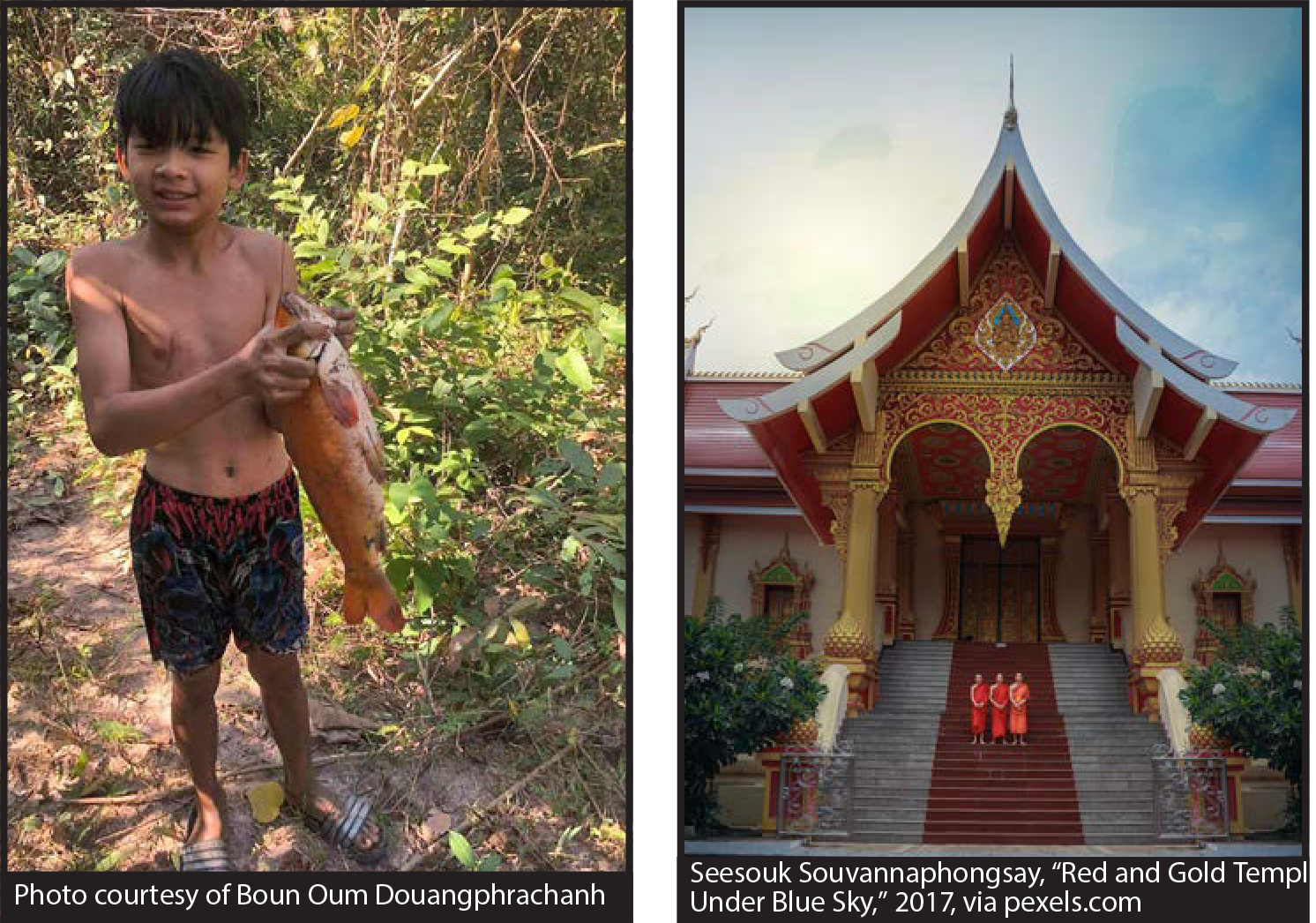
Phrakhounmany “Air” Philavanh farms on 11 acres near Milo, Iowa, raising a diversity of livestock and crops. Air immigrated to Iowa from Laos in 1984 and started farming in 2010. He loves to share what he’s learned with other immigrant communities in Iowa, his neighbors and his family and friends in Laos. Applying lessons from his grandpa, whom he calls “a guiding energy in his heart,” Air aims to re-create a simple Laotian farm to showcase history and farmer ingenuity.
The author of “Out of Africa,” Karen Blixen, said the cure for everything is saltwater: sweat, tears or the sea. Now, I live on the east coast of Iowa. So the only thing I’ve got is a big muddy river. My story is about sweat and tears. Meatloaf would’ve said two out of three ain’t bad.
In the summer of 2019, Lori and her daughter, Betsy, drove from Waukesha, Wisconsin, to visit Miss Effie’s. It was Betsy’s 16th birthday, and the only thing she wanted was a Quad City birthday party. She wanted Whitey’s Ice Cream. She wanted Hungry Hobo Sandwiches and she wanted to visit Miss Effie’s. Now, they had been regular customers at Miss Eff’s in the past years. They would swing in the swhoopy swing. They would chase my ducks. They would play with my kittens and Lori would pick buckets full of flowers to take home. It was a great way for a mom to relax out in the country on a hot summer day.
Betsy even had her sixth birthday party on the farm. Lori and her sister, Michelle, took my cornzebo, which is an old corn crib. And they filled it full of crepe paper flowers. They had vintage table clothes. They had antique dishes. It was the perfect little girl’s garden party. The little girls go parading through my garden, all dressed up in their Sunday best with great big hats, full of flowers and ribbons. And they had a wonderful time. Except, it was 98 degrees with humidity to match. The ice cream melted, the frosting got sticky on the cupcakes and those little girls wilted like the flowers in my garden. But it must have been memorable because Betsy wanted to come back in 2019 to celebrate her 16th birthday. As she danced through the garden, she declared this was truly her happy place.
My husband Cliff was working in the garden that day, actually prepping for a PFI field day out on the farm, and he was weeding and weeding and weeding. Betsy pranced over to him and said, “Can I have my senior pictures taken here?” He turned and he said, “Of course you can,” because that’s one of the things we do. Lori and Betsy filled their car full of ice cream, full of sub sandwiches and buckets full of flowers and headed up to Wisconsin, again having had a wonderful day on the farm.
Our lives, Cliff and I, were going to change drastically within just a couple of weeks. I woke in the middle of the night to hear Cliff gasping for air. I rushed him to the ER. We spent four days in the hospital and after several different diagnosis, they said, “This is pneumonia”. Cliff came home with pneumonia and a new apparatus for the garden, an oxygen tank. The next three months were spent at doctor’s appointments, one after another after another.
We went through the entire alphabet of tests. The CT scans, the MRIs, the PET scans and the X-rays and finally, 3½ months later, we discovered that Cliff had lung cancer. He went downhill really, really fast. We ended up at the University of Iowa hospital and on Jan. 1, the oncologist asked, “We’re going to throw a Hail Mary pass. Are you willing to try to catch it?” And we said yes. They started an extremely aggressive form of chemotherapy that none of the other doctors thought was a good idea. Cliff did amazing. On March 6, we went in, had a CT scan and the oncologist said, “The tumors are shrinking. The plaque-like cancer deposit on the lung is going away. You might be making a recovery. This is looking really good.”
Twelve days later, though, Cliff spiked a fever of 103 and I had to rush to Iowa City by ambulance. He had pneumonia again. First we tried one antibiotic and then another, and then another. Five antibiotics later, nothing was working. They put him in palliative care and then they announced that it was time for hospice. And when they tell you that the person you love more than anything in the world is dying, you try to cram every conversation that you planned for the next 20 years into those very few days. We talked about our goals, talked about our memories. We talked about how much we loved each other. And we talked about the farm.
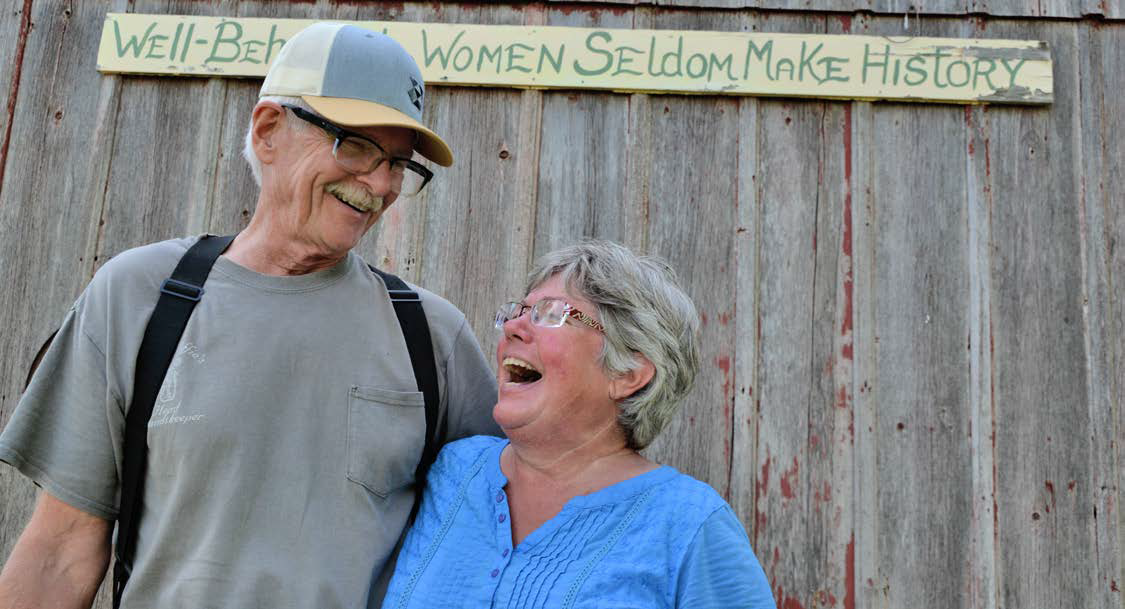
Cliff was my head groundskeeper. He was the man that took every silly idea I ever had and not only made it work, he made it better. I was crying and I said, “I can’t do this farm without you.” Cliff replied, “You have to. There’s a 16-year-old girl in Wisconsin that wants to have her senior pictures taken.” Cliff died on April 2, at the beginning of COVID. I was sent home brokenhearted to an empty house and quarantined because I had spent the last 15 days at the hospital and nobody knew what COVID was spreading and how it was going. So there was no funeral. There was no visitation. I couldn’t even go to his burial. And I would say I felt alone. I was alone. But I was surrounded with the sweat of my community.
Matt and Alyssa, flower farmers from Davenport, created spreadsheets of all of my gardens and had people sign up to clean them. My friend, Rebecca, took half of my chickens. Bob, my beekeeper, built a compost bin system for me and created the potting shed that was only in my husband’s mind, and built it for me. The Vegan Cookbook Club came out and planted all of my plugs and spread pallets full of mulch for me. John, Jim and Doug, friends from our wine club, built the greenhouse for me. And when I asked, “Why are you doing this for me?” they said, “We love Cliff as much as you do.”
I had ordered plugs for zinnias because I realized I wasn’t going to be able to seed anything. But I got bumped out of the zinnia order that year. Now you can’t be a flower farmer in Iowa without having zinnias. So I put a call out on Facebook and I said, “Hey, anybody have any zinnias for me?” Seven flower farmers bought trays of zinnias for me. I had every shape, every size and every color of zinnias that is ever out there. It was fantastic.
But there was one gal that knew I needed a kick in the ass to get out of bed every day. And my dear friend, Connie, said, “Flowers will get you through this.” She had another problem. She sold to florists that year. With no weddings or funerals, she had flowers and no customers. I had customers but no flowers. So we went together and formed a loose partnership that did bouquets together and sold them. We did a CSA together, sold them. We taught classes and we’ve got tricks up our sleeve for this year that people won’t believe.
I made it through 2020. I made it through 2021 and I will make it through 2022. And Betsy, you want to know about Betsy? On a very hot day in August 2021, Betsy drove out from Waukesha, Wisconsin, and had her senior picture taken on my farm. And there was saltwater, lots and lots of saltwater.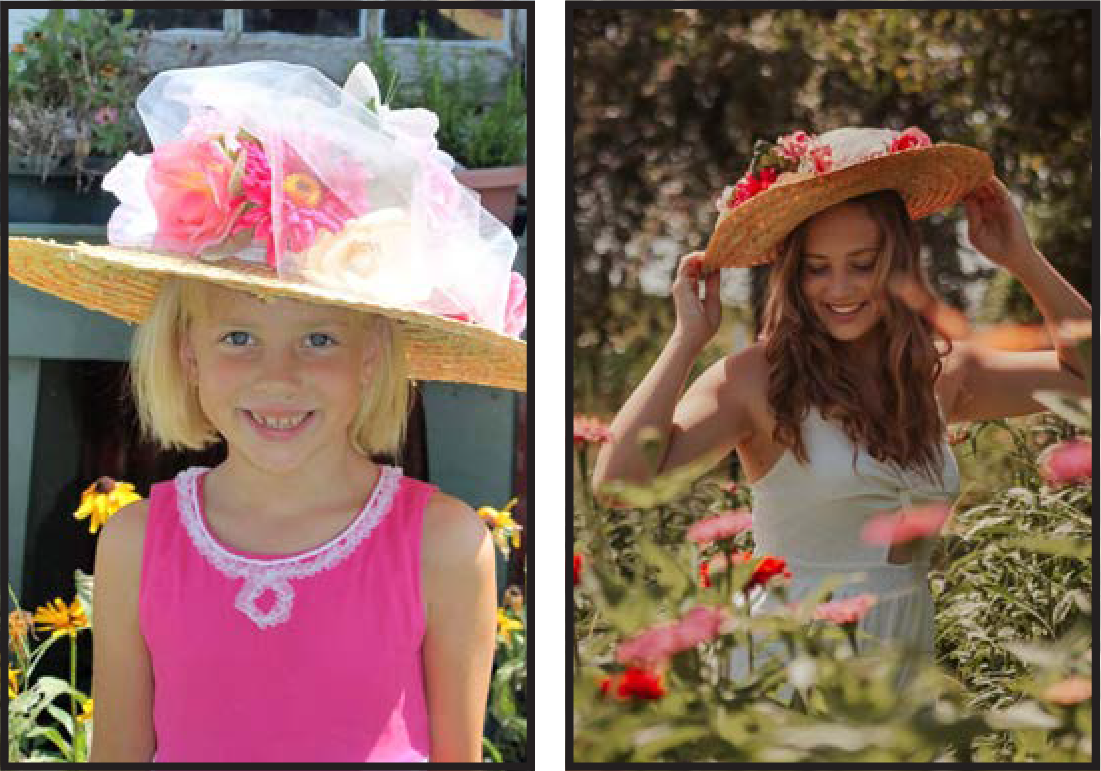
Cathy Lafrenz founded Miss Effie’s Country Flowers and Garden Stuff in 2002. Miss Effie’s was Iowa’s first U-pick flower farm, now featuring more than 90 varieties of flowers. The farm also boasts a Summer Kitchen shop, and eggs from 20 breeds of chickens. Miss Effie’s is a partner site of Silos and Smokestacks National Heritage Area.
Maja: Aug. 10, 2020, it was hot, it was dry and there was no sign of rain in the forecast. Carmen and I found ourselves standing on the side of the gravel road, staring down into the ditch where three or four of our own lambs had escaped their electro netting, crawled under a barbed wire fence and were happily grazing in a patch of poison ivy.
Carmen: Of course, it happened to be a Monday, and Mondays are some of our busiest days on the farm. It’s the day we deliver our community supported agriculture shares. We harvest a huge variety of vegetables and get them into the walk-in cooler as quickly as possible so we can get them organized and delivered to the customers, all in one day.
On this Monday, we left the rest of our crew harvesting vegetables, after the neighbor called us, to go deal with these lambs. And the lambs not only were in the ditch, they were pretty far from a gate on either side. We decided that the fastest way to get them back where they needed to go was to herd them back through the hole they came out of, then crawl through the poison ivy underneath the fence and get them back into the electric net. I told Maja, “I am going to have to shower before we go to the CSA delivery, after this poison ivy.” We get the lambs into the fence. We fix the energizer and we hop in the truck to go back to our farm.
Maja: And we thought that was the worst thing that was going to happen to us that day.
Carmen: In the five minutes it took us to get back to the farm, we learned on the radio that there was a strong storm in Grinnell with winds up to 70 miles an hour headed towards us.
Maja: It was going 70, down 80.
Carmen: We knew we had about an hour to prepare. When we got back to the farm, the rest of the crew had finished harvesting and were in our packing shed, getting everything organized for the delivery. We jumped into action to prepare for the storm.
I jumped right on a tractor. We’d received a load of round bales a couple days before and I didn’t want them to get rained on. So I’m moving round bales into the barn.
Maja: And I headed out to our two high tunnel greenhouses to try to close them down and prepare for this apparent storm that was heading our way. As I headed out to the greenhouses, I looked back to the west and the sight of the dark wall cloud already racing towards us really kicked my butt into gear.
Carmen: I had two bales left when the storm hit, and I could tell by the speed at which my eyes filled with dust that this was going to be worse than we had expected.
Maja: And I had almost finished wiggle-wiring our high tunnels shut when the storm struck and blew my hat off my head. I sheltered behind the high tunnel for a second, but realized I couldn’t stay there hiding behind a building that may in fact blow away. So I took off and hightailed it back to our packing shed.
Carmen: Maja and I met in the packing shed, where the rest of the crew was furiously trying to continue packing the CSA share. I was like, “I think we should stop.” And then I realized we had forgotten the goats in a bad location for the storm. In our panic, all four of us ran back out into the storm to get the goats.
Maja: Four girls, seven goats, two dogs, all desperately sprinting in a single-file line into the wind and water. We ditched the goats in the barn and ran up to our house, where we stood dripping in the living room, not the basement, watching the trees fall down just outside the window.
Carmen: After the storm passed, we realized there was no way we could get to town and deliver the CSA share. And we couldn’t even communicate with anyone. We didn’t know it at the time, but a cell phone tower had gone down. Instead, we set to work, trying to make sure our livestock was all okay. We had livestock in five places, and we patched up some fences and made sure everyone would be okay for the night, and hoped the electricity would come back on in the morning.
Maja: Day two.
Carmen: I woke up and the still heat in my room let me know the electricity had not come back on. And I also immediately realized that I had developed a really horrible case of poison ivy in my left armpit from crawling under a fence in the ditch and forgetting to shower.
Maja: That morning, I attempted to grind the coffee beans for our critical morning coffee by putting them in a zip-lock bag and smashing them with a brick.
Carmen: After drinking our weak coffee, we packed up all of the vegetables we’d harvested the day before. And some friends an hour north of us had gotten their electricity back, allowing us to load up the trucks and bring all of our vegetables to a functional walk-in cooler. This was a little bit challenging with my armpit ivy, but I made it work. On the way back, we stopped at the one gas station with gasoline and waited in a pretty long line to get gasoline to power a generator our mom had.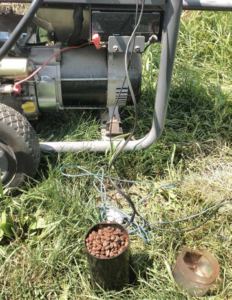
Maja: The generator was at our mom’s house, which is about 5 miles down the road. We thought it would be better to run the generator from our farm so we could water all of our livestock, which were distributed around the property. We loaded it up, brought it back to the farm and quickly realized we didn’t have a critical adapter piece to hook it up to our own well pump. So we had to schlep it back to our mom’s place. And we began the process of watering all of our livestock using a 50-gallon drum in the back of our side-by-side utility vehicle.
Carmen: This wasn’t all bad. As we were driving around our neighborhood several times a day, we ran into a lot of other neighbors driving around the neighborhood with buckets of water in the backs of their trucks. We hadn’t seen people in a while because of COVID, and we were really busy. So we caught up and were even able to charge our cell phones.
Maja: Day three.
Carmen: A friend called who had heard about the storm. He was going to be passing through the area and asked if we needed anything. I was able to give him the exact adapter part we needed. After visiting four or five stores, he bought the last adapter in Kearney, Nebraska.
Maja: Day four.
Carmen: Our friend arrived with the adapter and we called the neighbor, who is good at electricity, who came right over. Got the generator hardwired into the well pump. And we had water.
Maja: Over the past couple of days of talking to our neighbors on the road, we had developed a pretty good sense of a lot of other people that were having trouble producing water for their livestock. We sent off some text messages and quickly became the neighborhood watering hole. It was also on day four that we realized we could plug the coffee grinder into the generator while it was running and make a better pot of coffee.
Carmen: It was really nice to have stronger coffee on this day because this was also our next CSA delivery day. We were able to harvest, pack and deliver CSA shares without electricity or refrigeration, which was a real milestone for us.
Maja: Day seven…
Maja and Carmen: The power came back on!
Carmen: And we still had a lot of work to do, but very slowly things started to go back to normal.
Maja: To be honest, we still have piles of wood sitting around from the derecho. But ultimately, we learned a couple of things. One, our neighborhood community is actually a lot stronger altogether than any one of us is by ourselves. And you really do get all the gossip when you’re the neighborhood watering hole.
Carmen: But probably most importantly, we learned that you should always shower after crawling through a ditch. Even if you don’t have electricity.
Sisters, Maja and Carmen Black, own and operate SunDog Farm and Local Harvest CSA near Solon, Iowa. On the diversified operation they raise vegetables for 200 families and graze a small flock of sheep. They also conduct on-farm research through the Cooperators’ Program. Carmen is a current PFI board member.



